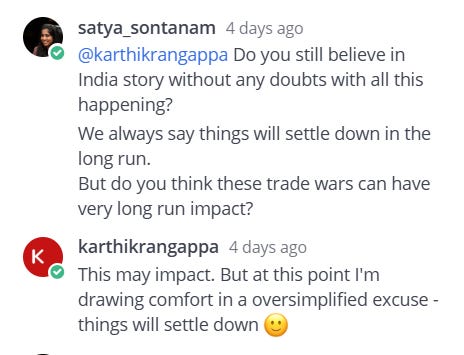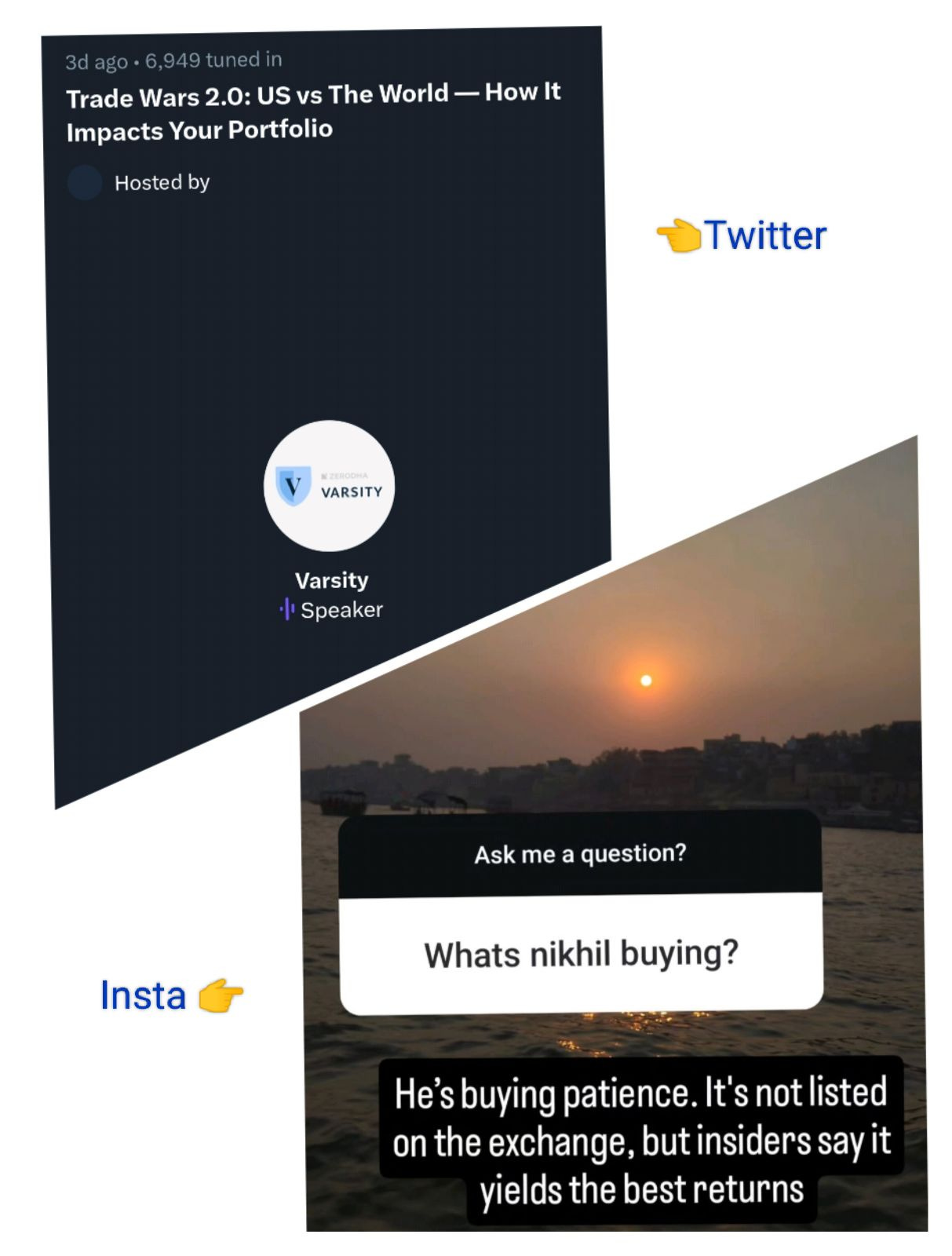This newsletter was put together by @Satya_Sontanam , Apurva Gururaj, and @Vineet_Rajani from our team. Thought of posting it here as well.
When I sat down to think of a topic for this newsletter last week, I thought since it’s April, the start of a new financial year, it’s a good time to talk about reviewing our financial plans.
But soon, there was only one piece of news dominating all headlines. It’s unlikely you missed it. Trump announced tariffs on almost every country, including two remote islands populated only by penguins and seals.
It was seen as something that would change the world order. That led to a worldwide crash in stock markets (although they recovered later). Headlines like “Billions of wealth eroded ” were everywhere.
Understandably, this caused discomfort for many investors. So I thought maybe we should talk about this - “What does it mean for your portfolio, and what can you do about it?”
Not that we know everything or can forecast the future. But maybe we can just share what we’re doing ourselves and what makes sense in times like this.
That’s really the idea behind this newsletter: to step back from all the noise, figure out what really matters, and decide if there’s something that we can actually do.
That’s also why I’ve come to enjoy writing this newsletter so much. It gives me an opportunity to articulate my thoughts and this edition was no different.
Even though I totally believe in the power of long-term investing, I’ll admit that during this whole trade war saga, I questioned my belief for a moment. So, I reached out to someone I trust in the markets, Karthik Rangappa.
He said something simple:
That response from Karthik reminded me to zoom out and not get consumed by the noise and headlines.
As I did that, my thoughts for this newsletter also evolved, and I circled back to my original thought of financial planning.
Financial planning, if done decently, is fundamentally sound and can help us ride through events like Trump tariffs without so much panic.
It typically looks into three things:
- Are you covered for emergencies through an emergency fund and insurance?
- Is the money meant for short-term goals kept safe?
- And is your long-term money growing in the right assets like equity?
And it’s not something to be changed with every news event.
Ideally, once or twice a year should be fine, as it will take care of your changing needs.
If there’s one thing that won’t throw your financial plan under the bus, it’s having reasonable return expectations for your long-term goals and giving them enough time to grow. After all, today’s long-term goals eventually become tomorrow’s short-term ones.
There are so many reports out there that point out that investors are often their own worst enemies. There’s this US-based research firm called Dalbar that comes out with a report every year since 1983, comparing how investors actually fared versus how the market performed.
Year after year, it shows the same thing. An average investor ends up earning way less than the market. Not because of the investments themselves but because of jumping in and out of the markets, maybe trying to do something in reaction to headlines.
When markets correct, it’s usually those without a financial cushion or clarity about their investments who are most affected. That’s when our instinct kicks in. The urge to feel secure again pushes us to react or take action. Often, the cure we are trying to give to our portfolios could be much worse than the disease itself.
As cliched as it may sound, this quote from Warren Buffet just keeps getting more relevant with every market crash and every recovery that follows:
“The stock market is a device for transferring money from the impatient to the patient.”
So yeah, all of us who have a decent financial plan in place with a diversified portfolio can hope to ride out this storm in the long run.
And if you’re someone who doesn’t have a financial plan yet, you have your answer. Maybe it’s less about what to do with the markets right now and more about what you need to put in place before the next storm hits.
Do you have a financial plan yet?
- Yes
- No
What exactly does a tariff mean?
A tariff is a tax that one country (like the US) imposes on goods imported from another country (like India). So, if India sends clothes, car parts, or steel to the US, the US government charges extra money (a tax) on those products.
This makes Indian products more expensive in the US.
Like every results season, TCS was the first one this time around too to release its results.
Its fourth-quarter profit slid 1.7% YoY even as revenues increased 5.3%. For the full year, net profit rose 5.8% on the back of a 6% growth in revenues. Overall, TCS reported weaker-than-expected results.
One would usually adjust their expectations of other IT companies’ results based on how TCS performed, but a look at the Nifty IT Index constituents tells a different story.
While TCS declined on 11th April, the day after the results, almost all other IT stocks gained. This does not necessarily mean that TCS has decoupled from its peers or that its peers are somehow better positioned.
Trump’s 90-day pause on the additional tariffs seems to have uplifted the broader market. The Nifty 50 and Nifty 500 both rose nearly 2% on 11 April. The IT stocks, and all other stocks, in general, seem to be echoing the same euphoric sentiment.
With all the uncertainty floating around last week, we tried to be as reachable as possible—whether it was through Twitter Spaces or an AMA on Insta—just in case you had doubts or needed to talk. We got some really thoughtful questions, some fun ones, and a few totally unexpected ones too. We love interacting with you all ![]()
This newsletter has been put together by Satya Sontanam, Apurva Gururaj, and Vineet Rajani. If you have any feedback for us or something you’d like for us to cover in the upcoming newsletters, do let us know. Mail us at [email protected]









